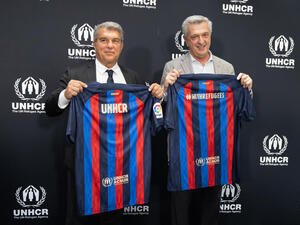UN and partners seek almost $US500 million to avert humanitarian disaster in Iraq
UN and partners seek almost $US500 million to avert humanitarian disaster in Iraq

These two Yazidi ladies were forced to flee their home in northern Iraq to escape from militant forces. They are among the many needing help.
BRUSSELS, Belgium, June 4 (UNHCR) - The United Nations and its partners on Thursday in Brussels launched a major humanitarian response plan for Iraq aimed at helping more than 5.6 million vulnerable Iraqis displaced within their own country.
Nearly 3 million people have been internally displaced since the start of 2014, joining the ranks of some 1 million uprooted earlier, while more than 180,000 are refugees in other countries.
UNHCR Assistant High Commissioner for Protection Volker Türk, in a statement released at the launch said the 2015 Humanitarian Response Plan for Iraq was "an all-out effort to alleviate human suffering" and added that "these are shocking numbers when one thinks of the individual stories behind each and every one and, collectively, as a measurement of the scale of human misery."
"Unfortunately, they are numbers which we expect to grow by the hundreds of thousands this year as the conflict continues, and whole communities are subjected to grave human rights violations, as recent events in Anbar [province] and elsewhere so amply demonstrate," he warned in Brussels. The UN fears the number of people needing immediate life-saving support could reach almost 10 million by the end of 2015.
With conflict escalating in Iraq, the United Nations and its NGO partners are asking donors for US$497 million to provide shelter, food, water and other life-saving services over the coming six months. The appeal will target communities across broad swathes of the country displaced or affected by the conflict.
Lise Grande, the United Nation's humanitarian coordinator for Iraq, said the aid operation was hanging by a thread. "The crisis in Iraq is one of the most complex and volatile anywhere in the world," she was quoted as saying in a press release. "Humanitarian partners have been doing everything they can to help. But more than 50 per cent of the operation will be shut down or cut back if money is not received immediately." The implications, she added, would be "catastrophic."
Violence since the start of last year has forced nearly 3 million people from their homes, leaving them scattered in more than 3,000 locations across the country. Human rights and rule of law are under constant assault as tensions sharpen. Mass executions, systematic rape and horrendous acts of violence are rampant.
So serious is the funding shortfall that 77 frontline health clinics have been forced to close and food rations for more than 1 million people have been reduced. Without additional funding, many more life-saving services will be withdrawn.
The aid operation is run in close partnership with the Iraqi government, whose own financial resources have been severely reduced by falling income from oil. Responsibility for the aid operation will transfer to national authorities as soon as financially and logistically feasible.
UNHCR's Türk said that Iraqi civilians caught up in a vicious cycle of cause and effect that generates more divisiveness and fragmentation, were "desperately in need of the services that adequate funding to this HRP [humanitarian response plan] can bring."
He said that UNHCR, as the lead coordinator for Protection, Emergency Shelter and Non-Food Items, and Camp Coordination and Camp Management, "stands shoulder-to-shoulder with all the humanitarian actors represented in the appeal before you today. Global outrage at the suffering of the Iraqi people needs to be met with global solidarity to support the funding of the services that can help mitigate some of the worst impacts of the conflict."
Türk, who recently met internally displaced Iraqis and Syrian refugees in northern Iraq, said the focus on "mitigating the humanitarian consequences of the conflict and providing life-saving and sustaining responses to protection needs is more vital than ever, particularly for individuals at risk on account of their age, gender, or other social status. We need to prevent children from being drawn into the conflict, through access to education, access to livelihoods for their families, and instilling a sense of possibility for their futures. We need to respond to the needs of survivors of sexual violence by ensuring their reintegration and facilitating their support."
The UNHCR protection chief also stressed the need to address the issues of access, impunity and solutions and added that this highlighted the need to strengthen the justice system, "enabling it to offer redress and to provide a mechanism for the Iraqi people to come to grips with the past and forge the cohesion and sense of national identity that binds together rather than divides."
Türk concluded that finding solutions to displacement was linked to state-building, national identity, and a future vision for Iraq. "Throughout the process, the protection needs of civilians affected by conflict, including the internally displaced, must therefore be kept front and centre of humanitarian action. It is imperative that we are able to sustain our efforts to ensure their protection, through funding of this appeal to support a stepped-up response," he said.








